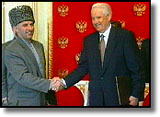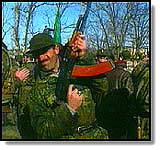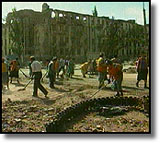
|
|
Boris Yeltsin: facing demands for massive reparations
|
Yeltsin Hints at Chechnya Concessions
The Russian President Boris Yeltsin and the Chechen President, Aslan Maskhadov, have agreed to set up a joint commission to work on a political settlement.
It comes just less than a year since a peace agreement was reached ending 21 months of armed conflict between Russia and the breakaway Chechen republic.
After talks in Moscow with the Chechen leader, President Yeltsin sounded a conciliatory note saying that steps should be continued towards establishing the freedom of the Chechen republic.

|
|
Yeltsin and Maskhadov at the signing of the peace accord
|
However, he said that freedom should not necessarily be defined as independence.
Although President Yeltsin chose his words carefully, up to now Moscow has been adamant that Chechnya must remain an integral part of Russia.
The Kremlin has made a concession of a kind by agreeing to begin talks on a political treaty immediately, when under last year's peace agreement the status of the breakaway republic need not be
resolved until the year 2001.

|
|
Chechens celebrating the end of the war
|
President Yeltsin also pledged to tighten up on the transfer of federal funds to Chechnya for the purpose of reconstruction, after major discrepancies were revealed between the amount of money sent, and the amount received.
The Chechen authorities have described Moscow's failure to provide promised levels of aid as a major obstacle to the development of relations.

|
|
The war left Grozny in ruins
|
Chechnya unilaterally declared independence in 1991. Three years later, Russian troops launched an offensive to regain control. The two sides fought a bitter war for nearly two years, which resulted in the deaths of tens of thousands.
Under the terms of the peace accord, Russia and Chechnya agreed to freeze a decision on Chechnya's final status for five years. But as far as the Chechen leadership are concerned, their republic is already an independent state.

|




